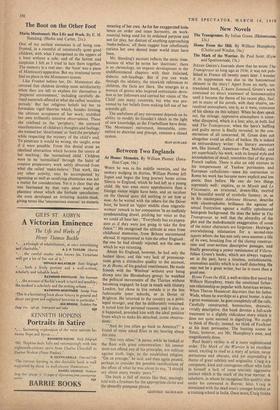Between Two Englands
At Home: Memoirs. By William Plomer. (Jona- than Cape, 16s.)
WHEN he was in his middle twenties, and the century nudging its thirties, William Plomer left Japan and began the long journey home across Siberia to England, which he had left as a young child. He was even more apprehensive than a foreign visitor might have been, and an incident on the Ostend quay did nothing to set him at ease. As he waited with the others for the Dover boat, he heard an 'upper middle class ungentle- woman' remark to her companion 'in an ineffably condescending drawl, pitching her voice so that we could all hear her : "Everybody has an expres- sion as if they were just going to take the first fence." ' He recognised the attitude at once from childhood memories, from Britons encountered abroad. It represented to him the other England : the one he had already rejected, not the one to which he was returning.
About his England, however, he had only the haziest ideas; and this very lack of preconcep- tions gives a distinctive quality to the account, in At Hoine, of his gradual resettlement. He made friends with the 'Woolves' without ever being drawn into the Bloomsbury group; he watched the political movements of the Thirties without becoming engaged; he kept in touch with literary London, but chose to live outside it in the less fashionable inner suburbs, or in Dover or Brighton. He returned to the country as a privi- leged stranger, and that he deliberately remained. It suited him for personal reasons; and it also, as it happened, provided him with the ideal position from which to make his detached, ironic observa- tions:
"And do you often go back to America?" a friend of mine asked Eliot in my hearing about this time.
"Not very often." A pause, while he looked at the floor with great concentration : his answer must not offend any of his principles, nor militate against truth, logic, or the established religion. "On an average," he said, and then again paused, perhaps to consider the possible ramifications of the effect of what he was about to say, "1 should say about every twenty years."'
The book is full of stories like that, teasingly told with a fondness for the appropriate cliché and the absurdly pompous phrase.
GEOFFREY NICHOLSON


































 Previous page
Previous page